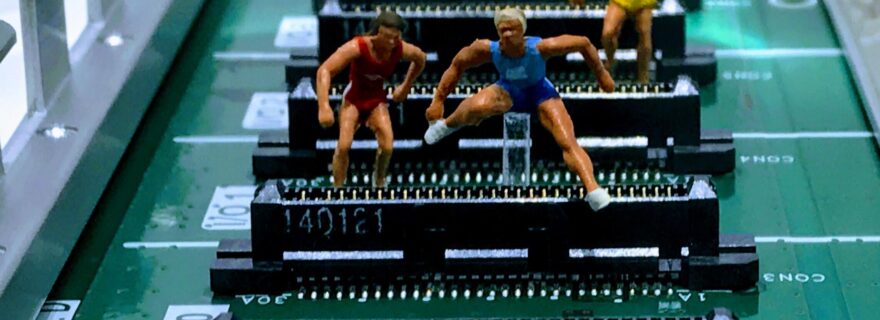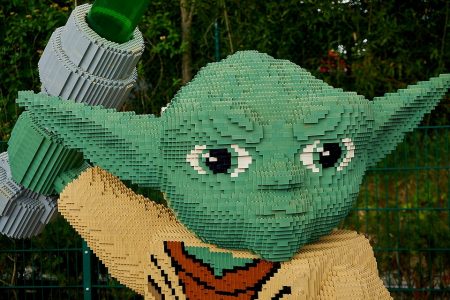Celebrating a decade of RDM professionals in The Netherlands
The LCRDM Network Day marked a decade of Research Data Management support across The Netherlands and celebrated the people necessary for RDM to happen. Staff from across the country joined to reflect on the value they have added to research and the challenges that the next decade will bring.
Twice a year, the Dutch organization that brings together RDM support staff – LCRDM, the National Coordination Point Research Data Management – organizes a networking day when we can come together, be inspired, share experiences, get to know each other better, and develop collaborations. During the pandemic, these events have continued online, but nothing beats a face-to-face meeting with this purpose, as evidenced by the success of our first in-person event since 2020, on Tuesday 29 March (click to see the full programme with speakers).
The day was hosted by Laurents Sesink, member of the LCRDM Advisory Group, and Manager of the Centre for Digital Scholarship in the Leiden University Libraries.
Increased funding in The Netherlands is leading to professionalization of data management, seamless infrastructure, new and evolving services, and growing staffing structures forming a complicated landscape of rich support and developments. Two technical presentations and a keynote helped focus the day on the pinnacle of what can be achieved: FAIR data by design, and data exploitation by AI. These were complemented by a thought-provoking presentation on what this new way of carrying out research means for roles and recognition of RDM support staff. In the afternoon we could choose to attend two small breakout groups to learn and discuss something new, with the day rounded off by lively (and loud!) drink breaks and networking lunch.
FAIR by design
The first two morning presentations focused on projects where data management has been deeply embedded in the research process.
The Maastricht Study is a population-based cohort study to look at the causes and consequences of type 2 diabetes and how it is related to other chronic diseases. The data collected by the international collaboration encompasses a huge variety of sources and types, and has already been used for ten years of research, driving a need to produce FAIR (findable, accessible, interoperable, and reusable) data.
Data Stewards have helped to make agreements on metadata, protocols for processing and data cleaning, and shared documentation. They train new PhD students on the basics of RDM and the use of data in the context of the project, then collaborate with them to review and check data after collection and processing, and to integrate new data into the larger dataset. They also help to facilitate a buddy system to help them develop skills such as scripting. All of this is made possible by several key factors:
- Combined input and skills from RDM support with researchers
- Being available and accessible to the researchers socially
- Having a drive for quality, data, and people
- Commitment of the board and supervisors
- Perseverance and patience.
The results show how close collaboration between data stewards and researchers as a team can produce FAIR data.
The UNLOCK project is a 10-year, multi-million Euro study to unlock the potential of microbes by investigating more of the 95% of microbes which cannot be cultured and therefore separated to study in isolation. It provides the infrastructure to do experiments: a biodiscovery lab, and a modular bioreactor at Wageningen University and Research, and a parallel cultivation at TU Delft.
Because of the nature of the research, and the need to move data around, FAIRification afterwards is not an option. Thus FAIR data is produced at source and shared in the cloud – they try to cut out the data steward in the middle!
By automating the FAIRification of data in the experiment design and producing a machine-actionable Experimental Design DMP, they are able to produce raw data semantically linked to the experimental design and experimental metadata, and transformed data semantically linked to data provenance and workflows, and workflow provenance.
Because researchers cannot do this themselves, the FAIR data platform is also one of the key project outputs and can be used by other research teams to produce FAIR data.
Time to rethink the academic vs support staff divide?
A new topic was broached after the break: Marta Teperek (Director 4TUResearchData and Head of Research Data Services, TU Delft Library) and Maria Cruz (Policy Advisor Open Science, NWO) prompted us to think about whether making a division between support staff and research staff was conducive to collaboration and partnership.
Many agree that Lindy Elkins-Tanton’s “hero model” of research, whereby researchers carry out scientific study and are rewarded with power and resources, should be replaced by a model that rewards team performance and collaboration. Research and innovation needs a diverse range of roles, skills, and contributions, including data stewards, among others. These roles are often forgotten, and yet research could not go on effectively without them.
The consequences for such support staff are that they are often seen as a ‘second’ category of staff that are not given the same benefits and regulatory framework as research staff. They are not allowed to supervise students nor apply for research funds, which limits development, but also makes them appear as a drain on university resources. They cannot be appointed under the same visa regulations, and benefit from different (often lower) remuneration and salary scales meaning highly skilled staff are disincentivized.
We were left to ponder over lunch how to raise awareness of these issues at funder and university levels to recognize the role that support staff (with its various definitions) play in the success of the university.
Afternoon breakout groups
After lunch participants could choose two of the following breakout groups:
- Research Software Management Support – discussion about how to address the sustainability of software in the (estimated) 12% of NWO-funded projects for which software will be the main output (and the many more where it is one of the minor outputs).
- Reprohack – a practical planning session to help those interested in organizing a reprohack at their institution. See the Reprohack Hub for more information.
- Text mining in EHRs (Electronic Healthcare Records) - presentation of a project at the UMC Utrecht in which natural language processing is used to structure and pseudonymize information in patient records for the purpose of research. Slides from the presentation are available.
- Accessibility checker – in anticipation of the implementation of the EU Directive on accessibility requirements for products and services, instructions on how to use accessibility checkers to improve slides, guides and training materials. Slides from the presentation are available.
- PIDs (Persistent Identifiers): Trust and Risks. Slides from the presentation are available.
The future of data processing with AI - Artificial Intelligence
The afternoon closed with a refreshing side-step into the world of AI to consider what’s possible, what will become normal, and what we should beware of in future. Stefan Leijnen, advisor at the Netherlands AI Coalition and lecturer from the AI Research Group (Utrecht University of Applied Sciences) presented the thought-provoking keynote “Artificial Intelligence: from Lab to Society”. We were left to look beyond our current challenges to a future that might be opened up by the increasing availability of FAIR data.
Participating in future LCRDM events and task groups
All RDM support staff are welcome to join LCRDM and to attend LCRDM networking events at no cost. You can join the mailing list, register in the pool of experts, sign up for a task group, and learn more from the LCRDM website, or follow the @LCRDM Twitter feed. The website also hosts a collection of reports, notes, and announcements about past and current work coordinated through LCRDM for inspiration and reference.
At Leiden University, Centre for Digital Scholarship, we are benefitting from the outputs produced through LCRDM, and we're looking forward to further collaboration with our Dutch RDM colleagues.





